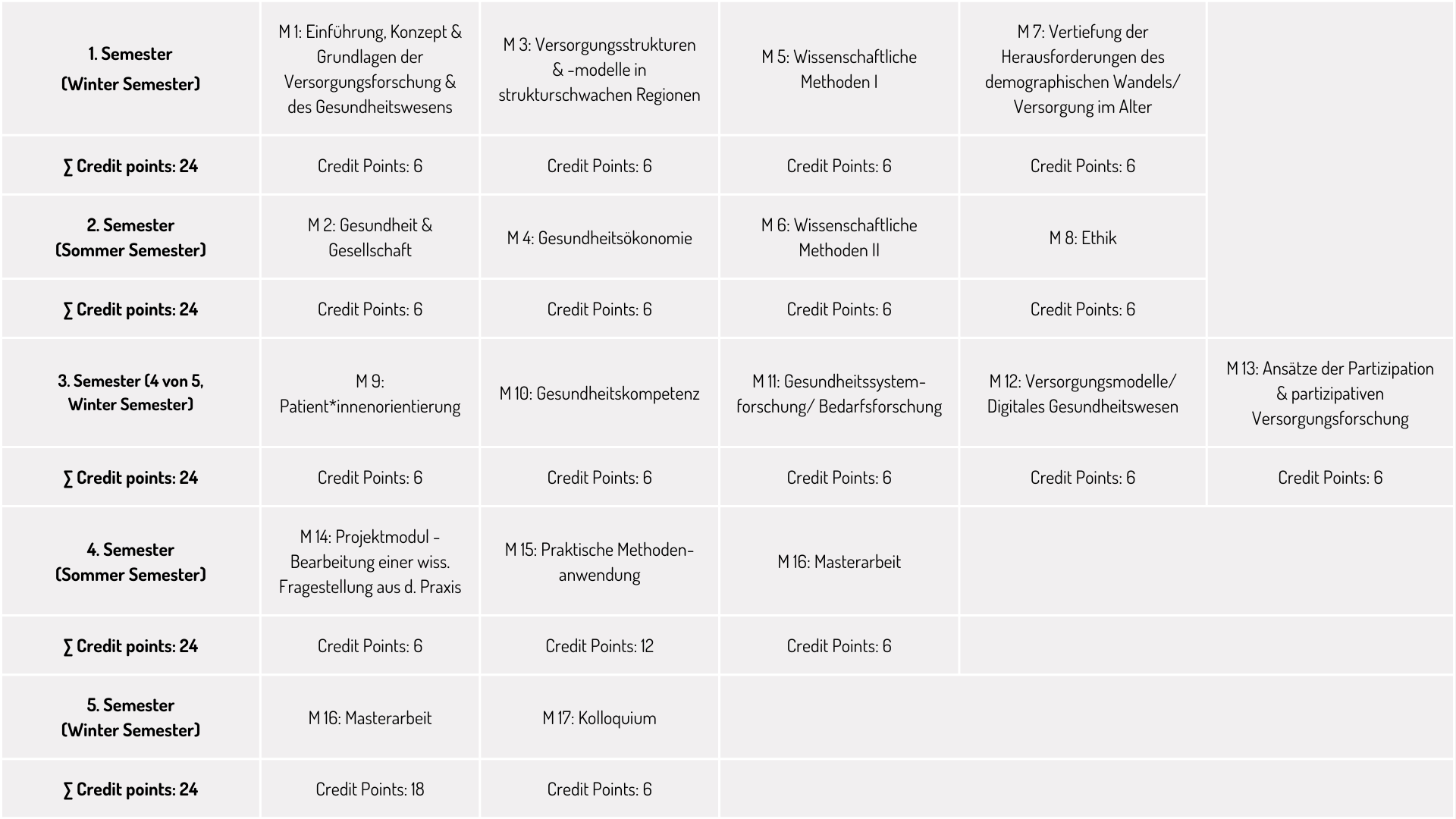
Since October 2022, the Faculty of Health Sciences (FGW) has been offering the new, science- and research-oriented, consecutive Master’s degree in Health Services Research (M.Sc.).
The focus and specialization of this Master’s degree course is ensuring person-centered care in structurally weak and rural regions.
The consecutive Master’s degree program is aimed at applicants with a first professionally qualifying university degree in the fields of health and nursing sciences, medical informatics, sports sciences with a focus on prevention, social sciences, midwifery sciences, statistics/biometrics, therapy sciences (physiotherapy, occupational therapy and speech therapy) or an equivalent first professionally qualifying university degree in a degree program that particularly qualifies applicants to achieve the study objectives.
This also includes first professionally qualifying university degrees in medicine or psychology.
The Master’s program in Health Services Research is offered on a part-time basis. While the attendance weeks take place in beautiful surroundings in Rüdersdorf near Berlin, the rest of the program can be completed practically and independently of location from home. The modules “Scientific Methods I & II” and “Ethics” are taught by lecturers from the Faculty of Health Sciences at the University of Potsdam. The modules “Introduction, Concept and Fundamentals of Health Services Research and the Healthcare System”, “Healthcare Structures and Models in Structurally Weak Regions” and “Health Systems Research and Needs Research” are taught by lecturers from the Faculty of Health Sciences at the MHB.
A special didactic feature is the teaching and learning form of problem-based learning (POL), in which students are given complex, practical tasks across all learning fields with action-related and reflective tasks.
Another highlight of the new Master’s degree program is the project module, in which students work independently in small groups on problems brought to the program by practice partners and develop practice-relevant solutions, which they then present to the practice partners.
The immediate proximity and direct exchange with relevant players in the healthcare system (statutory health insurance companies, associations of statutory health insurance physicians, the Federal Joint Committee, lobbyists in the field of healthcare policy, the Bundestag, etc.) also offers Master’s students the opportunity to make important contacts for their future careers during their studies.


At the end of the degree program, students will be able to analyze and evaluate current challenges in healthcare and changing healthcare structures and processes in a differentiated manner. In addition, the focus is on the development and implementation of practical and patient-orientated solutions and recommendations for action on site.
The program structure is based on the currently developed core content of Master’s programs in health services research of the working group of university lecturers of the German Network for Health Services Research, in which the MHB plays a leading role. The focus and specialization of the Master’s degree course in Health Services Research is ensuring person-centered care in structurally weak and rural regions.
The Master’s in Health Services Research qualifies graduates for scientific-research activities in research institutions and associations and for professions in the healthcare sector. With regard to the scientific focus, activities in the areas of research at universities, colleges, research institutions or clinics are possible. It is also conceivable to work in a managerial, steering or lecturing capacity in healthcare institutions, such as ministries, offices, associations, health insurance companies, administrations, funding organisations, players in the healthcare industry and healthcare policy or pharmaceutical companies or companies with a focus on medical technology. Consultancy tasks in patient safety, quality development and assurance as well as training and further education in the healthcare sector are also possible.
The Faculty of Health Sciences emerged from the “Brandenburg Health Campus” initiative and was established in June 2018 as a faculty of three supporting universities: the University of Potsdam, the Brandenburg University of Technology Cottbus-Senftenberg and the Brandenburg Medical School Theodor Fontane. In addition to cooperation between the sponsoring universities, collaboration in research and teaching with academics from other institutions in the state is encouraged and expressly desired.
The Faculty of Health Sciences aims to strengthen cooperation between university and non-university scientists in the state by intensifying joint research activities. In this way, effective concepts for improved healthcare can be developed in the long term.
The Master’s degree program in Health Services Research was initiated as the first degree program in the Faculty of Health Sciences and is based at the Brandenburg Medical School Theodor Fontane (MHB). The MHB is a state-recognized university with municipal and non-profit sponsorship, which was founded in 2014 with the aim of counteracting the problems of medical care for the population of the structurally weak state of Brandenburg. In 2019, the Centre for Health Services Research Brandenburg (ZFV-BB) was founded as one of the university’s current three scientific centers.